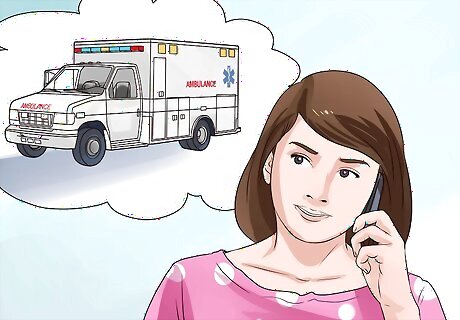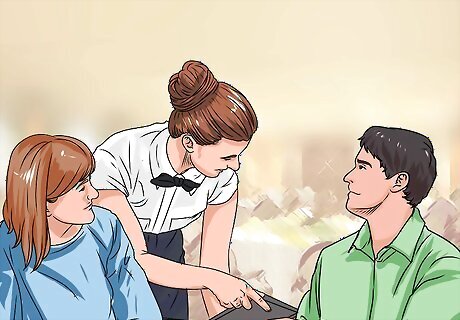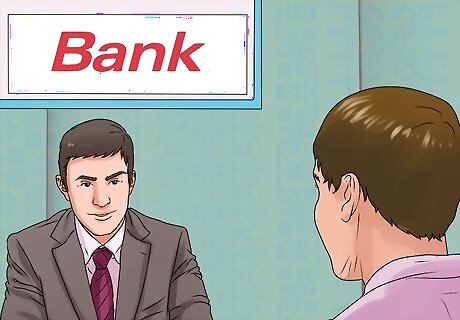
views
Avoiding Hazardous Careers

Find a career with low on-the-job injuries. Let’s be clear: some jobs are just more dangerous than others and have higher rates of on-the-job accidents and fatalities. These careers may be more dangerous because they involve heavy machinery. They may also be risky because they expose workers to things like falls, explosions, electricity, drowning, or other dangerous situations. Consider checking with the US Bureau of Labor Statistics to find out more, as they keep track of fatal and non-fatal rates of injury in different sectors each year. For example, agriculture, mining, and construction all have very high rates of on-the-job injury – usually in accidents with heavy machinery or vehicles and falls. Security guards and taxi drivers also face a higher risk of violence from other people. As far as relative risk goes, some of the most dangerous careers include logging, fishing, construction, metal working, and taxi driving.

Stay off the roads. If there’s one thing the certain unhealthy jobs share, it’s that they take place behind the wheel of an automobile in transportation. According to the US Bureau of Labor Statistics, truck drivers have the highest number of total fatalities – and of these fatalities, 68% are in crashes. But police officers and taxi drivers also make the list, as well, with high percentages of fatalities in crashes. Transport is dangerous – driving cars or trucks for hundreds or thousands of miles each year always carries the risk of traffic accidents. More than the danger of a crash, transport careers put physical and emotional stress on workers. It means that you’ll be sitting for long periods of time – in fact, transport workers have some of the highest levels of obesity and smoking. Transport workers can also be exposed to harmful fumes and chemicals. For example, delivery truck drivers who sit at loading docks may be a higher risk for chronic lung problems.

Avoid dangerous substances. Some jobs require people to work with or be exposed to harmful substances. The risk might be direct and take place during manual labor – like steel workers working with molten metal – or it could be a long-term health risk from exposure to things like dust, fumes, or smoke. Keep this in mind if you’re looking for a health career. Miners and construction workers can be exposed to dangerous substances by breathing in dust from coal, concrete, and wood. Farmers are exposed to things like grain molds, pesticides, and herbicides, which over time can lead to lung damage or neurological problems. Dangerous substances aren’t just for manual laborers, though. You’ll want to avoid more common things like second-hand smoke, too, which bartenders, waiters, and restaurant hosts can be exposed to.
Limiting Stress, Sitting, and Long Hours

Manage your stress levels. Some amount of stress and challenge on the job is a great thing. In fact, workers may express less job satisfaction when they have higher levels of on-the-job boredom, whether from lack of challenge or doing the same things every day. But too much stress can be a bad thing, as well, and make you less physically and mentally healthy. Too much stress can preoccupy you. Work-related pressure can make you feel stressed and fatigued, affect your personal relationships, and even trigger bouts of burnout and depression. Stress can have negative physical effects, too. Overly stressed workers may eat erratically, exercise less, and end up with more problems with weight, cholesterol, and high blood pressure. Look for a career with a healthy balance, one where you feel challenged but not overwhelmed by your duties. EXPERT TIP Elizabeth Douglas Elizabeth Douglas CEO of wikiHow Elizabeth Douglas is the CEO of wikiHow. Elizabeth has over 15 years of experience working and managing teams in the tech industry. She has held roles in multiple areas, including computer engineering, user experience, and product management. She received her BS in Computer Science and her Master of Business Administration (MBA) from Stanford University. Elizabeth Douglas Elizabeth Douglas CEO of wikiHow Think about how you manage stress. Elizabeth Douglas, the CEO of wikiHow, says: "If you're not good at managing stress, avoid choosing a job that's very stressful. For instance, you might choose a job that you're good at from the outset, rather than one where you're going to have to grow a lot. Another way to minimize stress is to avoid a job with crazy hours and lots of travel, which can be very taxing on people's health."

Find a job that gets you safely moving. Thinking that a cushy desk job might be for you? Desk jobs might be healthier in some ways than those with a high risk of injury, like construction, but they keep you sitting for long periods of time. Doctors now think that this can be a long-term health risk and a factor in things like obesity, cardiovascular problems, and cancer. Studies show that more time in front of electronic screens correlates with a higher risk of cardiovascular problems, including heart attacks, as well as death from any cause. Trying to offset the sitting by going to the gym a few times per week does not seem to help, either. Does this mean you should favor active jobs over desk jobs? Farmers, loggers, and construction workers all get more exercise on the job, but they are also at a much greater risk for accidental injuries and death. Try to find a balance between workplace safety and activity. Teachers and nurses, for example, are safe professions but score well in daily physical activity, especially in walking. Try to add movement to your routine if you end up at a desk job, too, like using a standing desk or walking during your meetings.

Work reasonable shifts and hours. The Center for Disease Control and Prevention reports that millions of people in the US work evening or night shifts. Millions more work 48 hours or more every week. While there is nothing wrong with being productive, both shift work and long hours are associated with safety and health risks. If you are looking for a healthy career, you may want to avoid these. Sleep deprivation is the biggest worry when it comes to shift work. Fatigue can lead to things like accidents, injuries, or even fatalities. Shift workers can also suffer from sleep disorders and are more likely to develop chronic heart and gastrointestinal diseases. You may also have more emotional problems with longer hours. Not surprisingly, people who put in more hours seem to have higher levels of work-family conflict, stress, and stress-related health problems like depression.
Finding Your Calling

Find a job with meaning for you. Choosing a healthy career isn’t just about avoiding things, but also about finding a line of work that will keep you engaged and satisfied. People spend about 80,000 hours working during a career. You’ll be happier and better off to land a job that provides you with a sense of meaning in addition to a regular paycheck. What kind of meaning should you look for in a career? Well, it mostly depends on you. Different people value different things, and different jobs offer different kinds of meaning. Some people want to serve a greater good and contribute to society and will find a non-profit organization fulfilling. Others might value creativity and learning and enjoy a field like teaching. Still others may want the prestige and money of a career in high finance or the independence of a small business owner.

Play to your strengths. You’ll also feel more satisfied in a career if you are able to use your strengths and talents. This is another part of finding a meaningful field and can be part of transitioning jobs: assess a job you’ve done, decide what you liked about it, and look for a job that allows you to do more of the same. You may have to think about what your strengths are. Try to get behind the activities you find fulfilling and pinpoint just what it is that you do well. For instance, you might have loved studying history in school but not know how to build a career around it. What is it about history that you like? What is it that you do well? Do you like to research? Do you have a good mind for dates and details? These can be strengths in many other careers.

See your boss as a partner. Another factor that can contribute to overall job satisfaction and “wellbeing” is a positive relationship with the boss. Of course, this is not always something under your control. But having good relations with a supervisor is associated with higher job satisfaction, leaving workers feeling more valued. Look for fields with higher levels of boss-satisfaction if you want to choose a healthy career. Careers that rank among the best in wellbeing also rank highly in good supervisor relationships. Workers in these careers are more likely to report that their bosses treat them like partners than like inferiors. Nurses, physicians, teachers, and other professionals all report high levels of perceived cooperation with their supervisors. So do managers and executives, as well as farmers, fishermen, foresters, and salespeople.

















Comments
0 comment